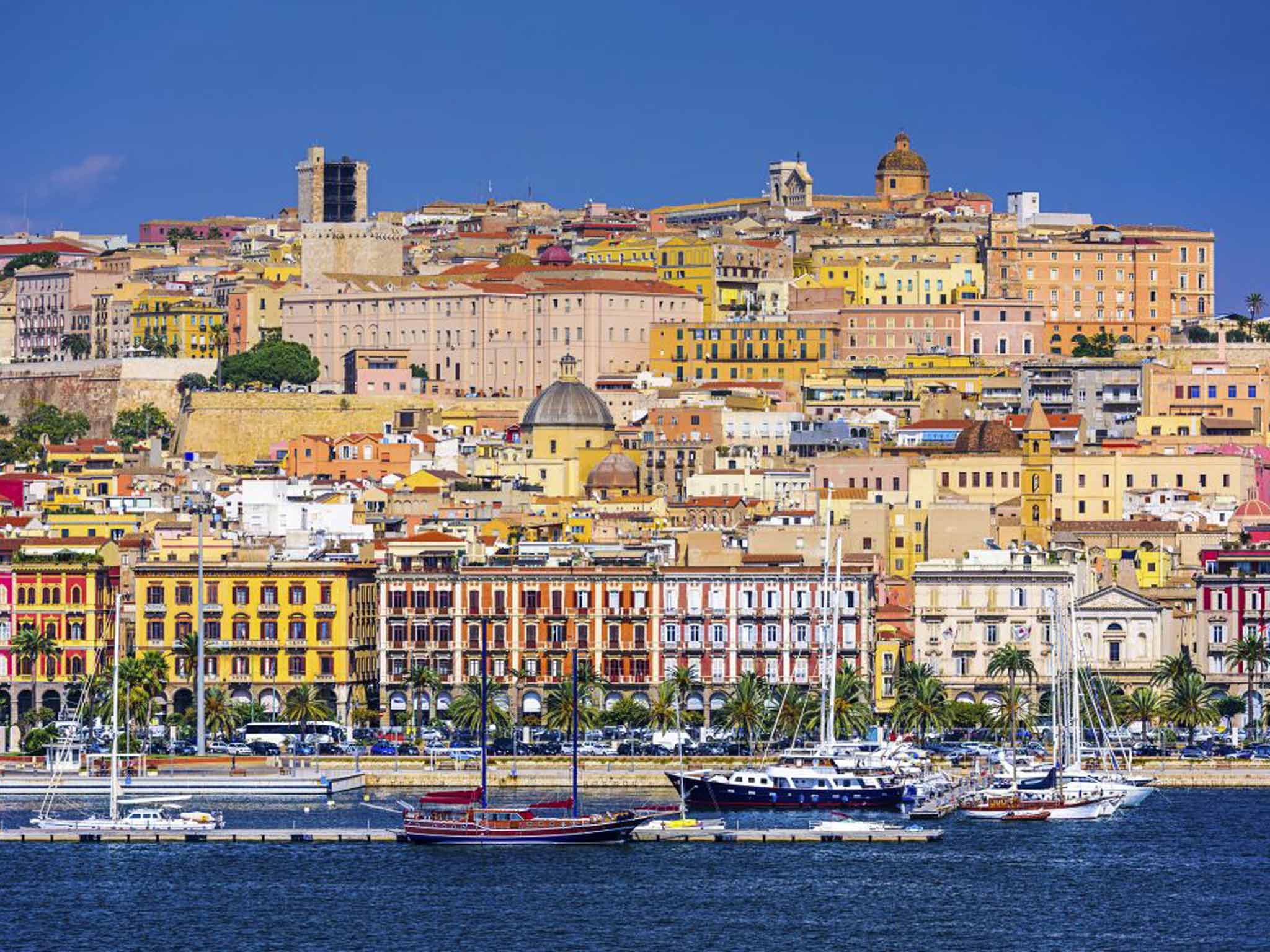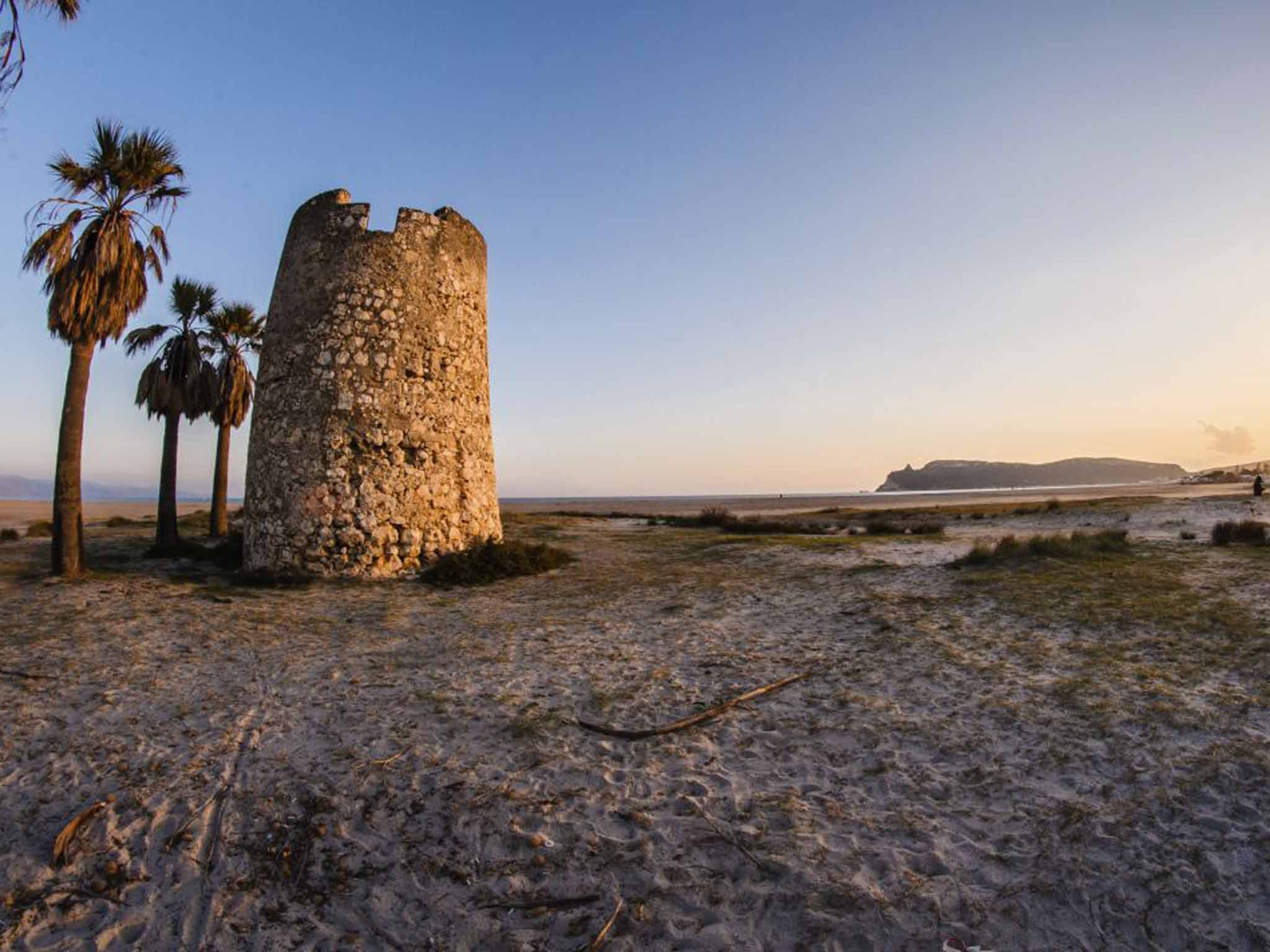Cagliari travel tips: Where to go and what to see in 48 hours
Italy's Capital of Culture in 2015 has 25 centuries of heritage, with new flights from the UK making it even more accessible. Simon Calder is your guide

Your support helps us to tell the story
From reproductive rights to climate change to Big Tech, The Independent is on the ground when the story is developing. Whether it's investigating the financials of Elon Musk's pro-Trump PAC or producing our latest documentary, 'The A Word', which shines a light on the American women fighting for reproductive rights, we know how important it is to parse out the facts from the messaging.
At such a critical moment in US history, we need reporters on the ground. Your donation allows us to keep sending journalists to speak to both sides of the story.
The Independent is trusted by Americans across the entire political spectrum. And unlike many other quality news outlets, we choose not to lock Americans out of our reporting and analysis with paywalls. We believe quality journalism should be available to everyone, paid for by those who can afford it.
Your support makes all the difference.Travel essentials
Why go now
Sardinia's fascinating capital is Italy's Capital of Culture for 2015. The city is full of fragments of the past – spanning Carthaginian, Roman, Byzantine, Spanish and Italian eras – overlaid with an indulgent layer of 21st-century dolce vita. And Cagliari's 25 centuries of heritage become more accessible this summer from Britain thanks to new flights.
Touch down
British Airways (0344 493 0787; ba.com) has launched flights from Gatwick, competing with easyJet (0843 104 5000; easyJet.com) from Stansted.
Cagliari's airport is at Elmas, 7km north-west of the city. Elmas-Aeroporto railway station is a five-minute walk from the terminal.Buy a €1.25 ticket from a ticket machine, and stamp it before you board. There are about four trains per hour, taking six minutes to reach Cagliari railway station (1).
Get your bearings
Sardinia's capital is at the head of the Golfo degli Angeli in the south of the second-largest island in the Mediterranean (after Sicily). The harbour is detached from the city by the traffic-choked Via Roma, which concludes at the Piazza Giacomo Matteoti – adjacent to the railway station. In the middle of the square stands a CTM transport information office (2) that doubles as a tourist bureau. It opens 9am-8pm daily; stock up on bus tickets here, because they cannot be bought on board; single-journey tickets cost €1.20 for up to 90 minutes; day pass €3.
Immediately north of Via Roma is the Marina quarter, founded by the Romans on a rough grid pattern.
To the north, Castello occupies a rocky bluff roughly in the shape of a diamond; this is where most of the tourist attractions are located. Castello is connected to the rest of the city by steep lanes and flights of steps, augmented by a number of free lifts.
Stampace, to the west, and Villanova, to the east, are working-class districts that are becoming gentrified.
Check in
The most appealing of Cagliari's many B&Bs is the Marina di Castello (3) at 75 Via Roma (00 39 070 289 0477; bedandbreakfastcagliaricity.it). Look for the old sign reading Albergo Vittoria; take a rickety old lift to the third floor of a 1925 building; press the door bell marked "Sabrina" and enter a re-invented residence. Four spacious rooms have access to a roof-top breakfast terrace high above the street, with a fine view of the harbour. The high-season (April-October) rate of €110 double includes breakfast on the roof.
Check availability
As a commercial and political hub, Cagliari has plenty of hotel beds. The new arrival is the four-star Flora (4), just north of the station at 45 Via Sassari (00 39 070 658 219; hotelfloracagliari.it), which brings a chic, boutique dimension to the Stampace quarter. A double room this week costs €115, excluding breakfast.
In the Marina district, with dozens of restaurants within 100 metres, choose the three-star Hotel Italia (5) at Via Sardegna 31 (00 39 070 660 410; hotelitaliacagliari.com) – built in 1928 but freshly refurbished and with pre-paid rates as low as €80 double including breakfast.
Click here to see a bigger image of the map
Day one
Take a view
The two-stage lift at the north side of the multi-storey car park on Viale Regina Elena elevates you to Piazzetta Mercede Mundula (6) where you get excellent views across Villanova, the lagoon and curving coastline – as well as seeing, in the foreground, how the Castello district rises from the raw rock.
Take a hike
From the piazzetta (6), head down Via Martini to the Palazzo Viceregio (7), whose opulent first-floor rooms are open 10am-6.30pm daily except Monday. A tourist office is tucked inside the entrance (10am-7pm daily; 00 39 070 677 7397; cagliariturismo.it).
Adjacent is the Cattedrale di Santa Maria (8), with a spectacular altar and a fascinating crypt. Open 8am-noon and 4pm-8pm daily, except on Sundays (8am-1pm and 4.30-8.30pm; main Mass 10.30am).
Next to the cathedral, the former city hall (9) is now an art museum (entry €4).
Take the steps that start opposite the cathedral entrance and descend through the narrow, cobbled lanes to the Elephant Gate (10) – so called because of the stone elephant standing opposite. As you pass through the gate, note the threatening portcullis above you.
On the downhill side, look up to see a marble elephant gazing out from the gate.
Either walk down the steps, or take the lift down to the Mercato di Santa Chiara (11) (7am-2pm daily except Sunday), perched above Piazza Yenne (12), one of the city's social hubs.
Lunch on the run
You could source a picnic from Santa Chiara market (11). Alternatively, seek out the brand-new Taccas (13) , a cavern-like restaurant at 22 Corso Vittorio Emanuele II (00 39 070 665839) – already proving popular for its panadas, pasty-like pies filled with vegetables, fish or meat. They cost €4-€5 each, with a €1 espresso to see you through the afternoon. Or hover at the entrance where panini are dispensed for €3.50 and a generous glass of wine is €2.
Window shopping
Cagliari's prime corner, where Via Roma and Largo Carlo Felice meet, is occupied by the handsome, early 20th-century bulk of La Rinascente (14) – Sardinia's leading department store, part of an 11-strong Italian chain (00 39 070 653271; rinascente.it). Its six floors have plenty of upmarket fashion, with a food hall at the top alongside a sophisticated bar. It also keeps long hours: 9am-9pm daily (from 10am on Sunday), unlike most shops, which take a break around 1pm-4pm.
Via Giuseppe Manno, running south-west from Piazza Yenne (12), is the venue for brands such as Diesel and Sisley.
An aperitif
For a sundowner, prime position is opposite the Caffè Libarium Nostrum (15) at 35 Via Santa Croce, on the west side of Castello; the restaurant has set up tables beside the parapet. Note that the already high menu prices are inflated by an un-Italian 20 per cent service charge.
On the east side, a glass of prosecco costs only €3.50 at the Caffè delle Arti (16), tucked away just south of the cathedral on Via Fossario. It has a hidden balcony where you can watch the sun set on the lagoon and the hills beyond the capital.
Dining with the locals
The main street for dining in the Marina quarter is Via Sardegna, parallel with Via Roma but a block inland. More than a dozen restaurants compete. The least fancy, and most interesting, is the wonderful Trattoria Lilliccu (17) at number 78 (00 39 070 652970). The dining room looks unchanged since its opening day in 1938: narrow and austere, with the walls decorated with black-and-white photographs. Fresh seafood and meat is served up cheerfully and economically, with a half-litre of house wine just €4.#

Day two
Sunday morning: go to church
Cagliari has a vast number of churches, great and small. The most revered is a tiny chapel hidden away in Stampace, devoted to Sant' Efisio (18) – Ephysius of Sardinia, the island's patron saint. He was martyred in 303 and his subsequent intervention in battle is believed to have protected Sardinia. The church faces a small piazza; the entrance to the cavernous crypt, full of offerings to his effigy, is around the corner on Via Sant' Efisio.
Out to brunch
Cagliari has a couple of classic Italian caffès. The handsome Antico Caffè 1855 (19), on Plaza Costituzione (00 39 070 658206; anticocaffe1855.it; 7am-2am daily) was created by a Genovese in the style of the grand cafés in his home city. Its signature dish is the "Admiral's Plateau", comprising a half-dozen oysters, two shrimps, two prawns and two clams for €25. More modest dishes include mozzarella and smoked salmon for €4 or crêpes for €7. If all you want is an espresso and a cornetto (Italian take on a croissant, not an ice-cream), look no further than La Svizzera (20) on the corner of Largo Carlo Felice and Via Crispi (00 39 070 653784).
A walk in the park
The Giardini Publici (21), at the highest point of Castello, where it narrows to a spur of rock, are former royal gardens now open to the masses. Take in the superb views from the terrace.
Cultural afternoon
Piazza dell'Arsenale is the location for a fine collection of antiquities, the Museo Archeologico (22) (00 39 070 655911; bit.ly/ArchMus; 9am-8pm daily except Monday, admission €5). It is largely devoted to the Nuraghic age, which took root in Sardinia in around 1800BC and continued for 13 centuries until Carthage took control. The chief artistic achievement comprised the bronzetti – miniature bronze statues of human figures and bulls, fashioned with remarkable intricacy. The "giants" of Mont'e Prama are from the same era. These bigger-than life-size stone human statues were discovered in farmland close to Sardinia's west coast in 1974.
Icing on the cake
East of Cagliari lies a saline lagoon, populated by flamingos, and beyond that a beach named Poetto. The beach has a fascinating range of buildings – at the north, derelict hotels and down-at-heel amusement park, to the south, extravagant villas with gardens spilling with palms and flowers.
Bus PQ from the city centre runs the entire length of the beach; PF does two-thirds then heads across the lagoon, giving close-ups of the bird life.
Join our commenting forum
Join thought-provoking conversations, follow other Independent readers and see their replies
Comments